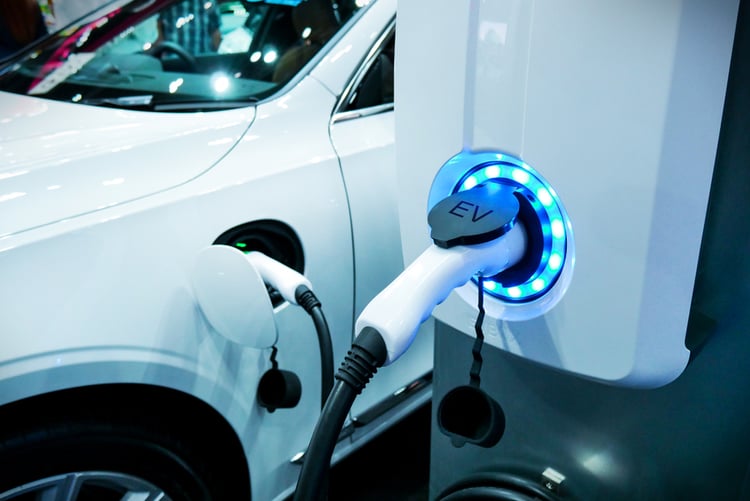A solar power system can sometimes generate more electricity than your building is consuming. This is most likely around midday, as there is a lot of sun and the solar panels can reach their maximum productivity. The inverters used by photovoltaic systems can reduce their production when generation exceeds consumption, but this represents wasted potential. Here we will discuss 4 ways to use surplus energy from a solar panel:
- Join a solar net metering or buyback program.
- Recharge electric vehicles with on-site charging stations.
- Storing surplus electricity in a battery system.
- Use surplus electricity to power a heat pump and store hot water.
The generation of surpluses happens regularly when a building has solar panels, since production and consumption do not always coincide. However, if the amount of unused generation is excessive, your solar power system is likely oversized. To ensure optimal solar capacity is installed, the best recommendation is to contact a professional engineering company.
Get a professional solar photovoltaic system project.
1) Participate in a solar net metering or buyback program
There are many electricity providers that offer net metering or solar buyback programs , which allow you to export excess generation to the local grid. A net metering program gives full credit for each kilowatt-hour, while a solar buyback program assigns a different price to exported energy (typically below the retail price). In both cases, you receive credit for generating electricity that would normally be wasted.
Many states have mandatory net metering requirements for electricity providers, but the benefit is not available everywhere. There are also cases where electric companies offer solar buyback programs, but the kWh price paid to you is much lower than the retail price. If this is your situation, there are other ways to use surplus solar energy.
2) Recharge Electric Vehicles with Surplus Solar Generation

Electric vehicles are becoming more popular, especially with the recent rise in petrol and diesel prices. According to the US Energy Information Administration, hybrid and electric vehicles reached 11% of US light vehicle sales in the fourth quarter of 2021. Additionally, the Biden administration released the Electric Vehicle Charging Action Plan that provides US $7.5 billion to help develop electric vehicle charging infrastructure in the US.
Combining solar panels with electric vehicle charging stations is a promising concept. Electric vehicle owners can use a local power source rather than relying on the grid or having to look for a charging station elsewhere. This is especially useful in buildings that receive a lot of visitors around noon, such as shopping malls with convenience stores and restaurants. If the building is equipped with DC fast chargers, EVs can be fully recharged while their owners visit a store or have lunch.
3) Store solar electricity in a battery system
Solar panels are economical, but they have an important limitation compared to fossil fuels. Sunlight is only available half of the time, while fossil fuels can be consumed at any time for power generation or heating purposes. However, when a commercial solar system is combined with batteries, it also becomes a 24/7 power source.
A battery system is especially useful if your electricity rate includes demand charges or time-of-use fees.
- Demand charges are calculated based on the highest kilowatt consumption during the billing period. A battery can be configured to “trim” peaks in electricity demand, providing power while reducing the corresponding load.
- Usage rates change throughout the day and electricity suppliers typically charge the highest prices per kWh when the network is experiencing peak demand. With a battery system, you can avoid consuming the electricity grid during peak demand times.
Energy storage systems often qualify for financial incentives , reducing initial cost and increasing ROI. The solar Investment Tax Credit also covers battery systems, as long as they are charged with solar panels.
4) Activate a heat pump and store hot water

We tend to think of battery systems when we talk about energy storage, but there are other options. Energy can also be stored as heat, which is useful in buildings that consume large amounts of hot water. Surplus electricity from a solar photovoltaic system can be used to power a heat pump and hot water can be stored in an insulated tank for later use.
This can also be achieved with a traditional resistance heater, but a heat pump is much more efficient. A resistance heater can only provide one watt of heat for every watt of electricity, while heat pumps produce 2 to 4 watts of heat per watt of electricity, depending on their efficiency. To ensure high performance, we recommend ENERGY STAR heat pumps.


2 comments
Great tips on optimizing surplus solar energy! Storing excess power in a battery system or using it for EV charging and heat pumps are smart ways to maximize your solar investment. Net metering is a solid option where available, but it’s great to know there are alternatives too. Thanks for the insights!
Ótimas dicas sobre como aproveitar a produção excedente de eletricidade dos painéis solares! Transformar o excedente em economia através de baterias, venda para a rede ou até mesmo aquecimento de água são estratégias inteligentes. Muito útil para otimizar investimentos e maximizar benefícios. Obrigado por compartilhar essas ideias práticas!